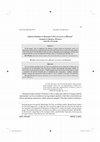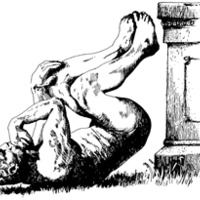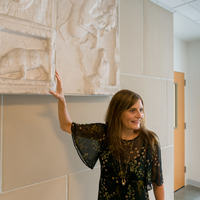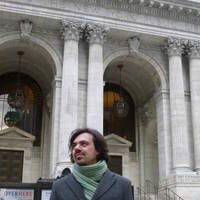Books by Alberto Quiroga

Focusing in turn on history, powerful individuals, under-represented voices and the arts, the ess... more Focusing in turn on history, powerful individuals, under-represented voices and the arts, the essays in this collection cover a wide variety of modern and contemporary narrative fiction from Jo Walton and L. Sprague De Camp to T. S. Chaudhry and Catherynne M. Valente. Chapters look into the question of chance versus determinism in the unfolding of historical events, the role individuals play in shaping a society or occasion, and the way art and literature symbolise important messages in counterfactual histories. They also show how uchronic narratives can take advantage of modern literary techniques to reveal new and relevant aspects of the past, giving voices to marginalised minorities and suppressed individuals of the ancient world.
Counterfactual fiction and uchronic narratives have been largely up until now the domain of literary critics. However, these modes of literature are here analysed by scholars of Ancient History, Egyptology and Classics, shedding important new light on how cultures of the ancient world have been (and still are) perceived, and to what extent our conceptions of the past are used to explore alternate presents and futures. Alternate history entices the imagination of the public by suggesting hypothetical scenarios that never occurred, underlining a latent tension between reality and imagination, and between determinism and contingency. This interest has resulted in a growing number of publications that gauge the impact of what-if narratives, and this one is the first to give scholars of the ancient world centre-stage.
Ianus. Innovación docente y reelaboraciones del legado clásico, 2018
Tübingen: Mohr Siebeck, 2013
Talanta: Amsterdam (2015)
Co-authored with Carmen García Sola. Berlin: Logos Verlag, 2013
Papers by Alberto Quiroga
SVMMA. Revista de Cultures Medievals, 2023
El presente artículo persigue investigar la presencia de periodos contrafactuales en la literatur... more El presente artículo persigue investigar la presencia de periodos contrafactuales en la literatura autobiográfica del periodo tardo-antiguo con el fin de analizar su función narratológica en dos obras de referencia de los siglos IV y V: la "Autobiografía" del sofista Libanio de Antioquía y las "Confesiones" de Agustín de Hipona. Con este objetivo en mente, se abordará en primera instancia un breve estudio del pensamiento contrafactual en la cultura grecorromana para, a continuación, proceder al análisis de su presencia en ambas autobiografías.
Literature, 2022
The study of periautologia (“self-praise”) in Ancient Greek literature has been somehow overlooke... more The study of periautologia (“self-praise”) in Ancient Greek literature has been somehow overlooked even though its presence is felt in numerous works. The absence of the analysis of periautologia is even more remarkable in the case of the works composed by the sophist Libanius of
Antioch given the autobiographical nature of most of his speeches. Thus, in this paper I surveyed the use and the purposes of periautologia in one of his speeches—Or. 2, To those who called him tiresome—in order to ascertain which rhetorical and literary strategies were deployed by Libanius.
The sophist’s concern with losing his influence in the cultural and political milieu of the end of the fourth century AD contributes to explain the frequent use of periautological passages in his Or. 2.
Florentia Iliberritana, 2020
Este artículo persigue aportar algunos matices sobre la concepción que de la bibliofilia y las bi... more Este artículo persigue aportar algunos matices sobre la concepción que de la bibliofilia y las bibliotecas se tenía en el periodo tardo-antiguo. Se presta especial atención a las referencias a libros y bibliotecas que el emperador Juliano hizo en su obra, dado que esas alusiones esconden una intencionalidad política y auto-representativa.
Mediterraneo Antico, 2010

Fortunatae, 2008
El presente trabajo estudia una obra de Luciano de Samosata, El Maestro de Oradores, con la inten... more El presente trabajo estudia una obra de Luciano de Samosata, El Maestro de Oradores, con la intención de analizar desde un punto de vista teórico dos de los officia oratoris -actio y elocutio-y sus implicaciones sociales y culturales. En el contexto histórico, cultural y literario de la Segunda Sofística la puesta en escena de un discurso era tan importante como su contenido mismo. La adecuación de gestos, voz y forma de caminar no sólo denotaba maestría en el campo de la retórica, sino que valores y roles sociales como la masculinidad o la pertenencia a las elites culturales dependían en gran medida de ello. ABSTRACT «'Who is Demosthenes in comparison with me?': Rhetoric, actio and elocutio in Lucian's Professor of Public Speaking». This paper deals with Lucian's Professor of Public Speaking and with the theoretical aspects of two officia oratoris -actio and elocutio-as well as its social and cultural ramifications. In the context of the literary and cultural milieu of the Second Sophistic rhetorical deliveries became as relevant as the speech itself. Gestures, voice and gait were synonymous not only with rhetorical mastery but with social roles and status. KEY WORDS: Lucian of Samosata. Second Sophistic. Actio. Elocutio.

MHNH, 2011
RESUMEN En este artículo pretendo poner de relieve la importancia de las historias de fantasmas e... more RESUMEN En este artículo pretendo poner de relieve la importancia de las historias de fantasmas en la narrativa de un historiador como Sozomeno. Resulta especialmente interesante analizar el proceso por el cual un motivo literario y cultural pagano como las historias de fantasmas es usado a comienzos del periodo bizantino por el cristianismo para estigmatizar cualquier elemento herético o pagano que amenazara el decurso natural-esto es, cristiano y ortodoxo-de la Historia. PALABRAS CLAVE: SOZOMENO, HISTORIAS DE FANTASMAS, CREDO NICENO, HÉCATE, HISTO RIO-GRA FÍA CRISTIANA. HISTORIAS DE FANTASMAS EN LA HISTORIA ECLESIÁSTICA DE SOZÓMENO ABSTRACT In this paper I aim to emphasize the infl uence of ghost stories in Sozomen's work. It is interesting to analyze how a pagan literary topic such as ghost stories was used by Christian authors in the fi rst period of the Byzantine Empire in order to stigmatize heretic and pagan elements that could threaten the normal development of History, that is, a Christian and Orthodox one. Et mihi discendi et tibi docendi facultatem otium praebet. Igi tur perquam velim scire, esse phantasmata et habere pro-priam fi guram numenque aliquod putes an inania et vana ex me tu nostro imaginem accipere. (Pliny the Younger, Ep. 27.7). Among his many pursuits, Professor Calvo's long term interest in magic and the supernatural can be accredited as having helped identify a link that existed between divine and human interaction within classical antiquity. The intervention of demons, Notas. Quiroga.indd 74 Notas. Quiroga.indd 74











Uploads
Books by Alberto Quiroga
Counterfactual fiction and uchronic narratives have been largely up until now the domain of literary critics. However, these modes of literature are here analysed by scholars of Ancient History, Egyptology and Classics, shedding important new light on how cultures of the ancient world have been (and still are) perceived, and to what extent our conceptions of the past are used to explore alternate presents and futures. Alternate history entices the imagination of the public by suggesting hypothetical scenarios that never occurred, underlining a latent tension between reality and imagination, and between determinism and contingency. This interest has resulted in a growing number of publications that gauge the impact of what-if narratives, and this one is the first to give scholars of the ancient world centre-stage.
Papers by Alberto Quiroga
Antioch given the autobiographical nature of most of his speeches. Thus, in this paper I surveyed the use and the purposes of periautologia in one of his speeches—Or. 2, To those who called him tiresome—in order to ascertain which rhetorical and literary strategies were deployed by Libanius.
The sophist’s concern with losing his influence in the cultural and political milieu of the end of the fourth century AD contributes to explain the frequent use of periautological passages in his Or. 2.
Counterfactual fiction and uchronic narratives have been largely up until now the domain of literary critics. However, these modes of literature are here analysed by scholars of Ancient History, Egyptology and Classics, shedding important new light on how cultures of the ancient world have been (and still are) perceived, and to what extent our conceptions of the past are used to explore alternate presents and futures. Alternate history entices the imagination of the public by suggesting hypothetical scenarios that never occurred, underlining a latent tension between reality and imagination, and between determinism and contingency. This interest has resulted in a growing number of publications that gauge the impact of what-if narratives, and this one is the first to give scholars of the ancient world centre-stage.
Antioch given the autobiographical nature of most of his speeches. Thus, in this paper I surveyed the use and the purposes of periautologia in one of his speeches—Or. 2, To those who called him tiresome—in order to ascertain which rhetorical and literary strategies were deployed by Libanius.
The sophist’s concern with losing his influence in the cultural and political milieu of the end of the fourth century AD contributes to explain the frequent use of periautological passages in his Or. 2.